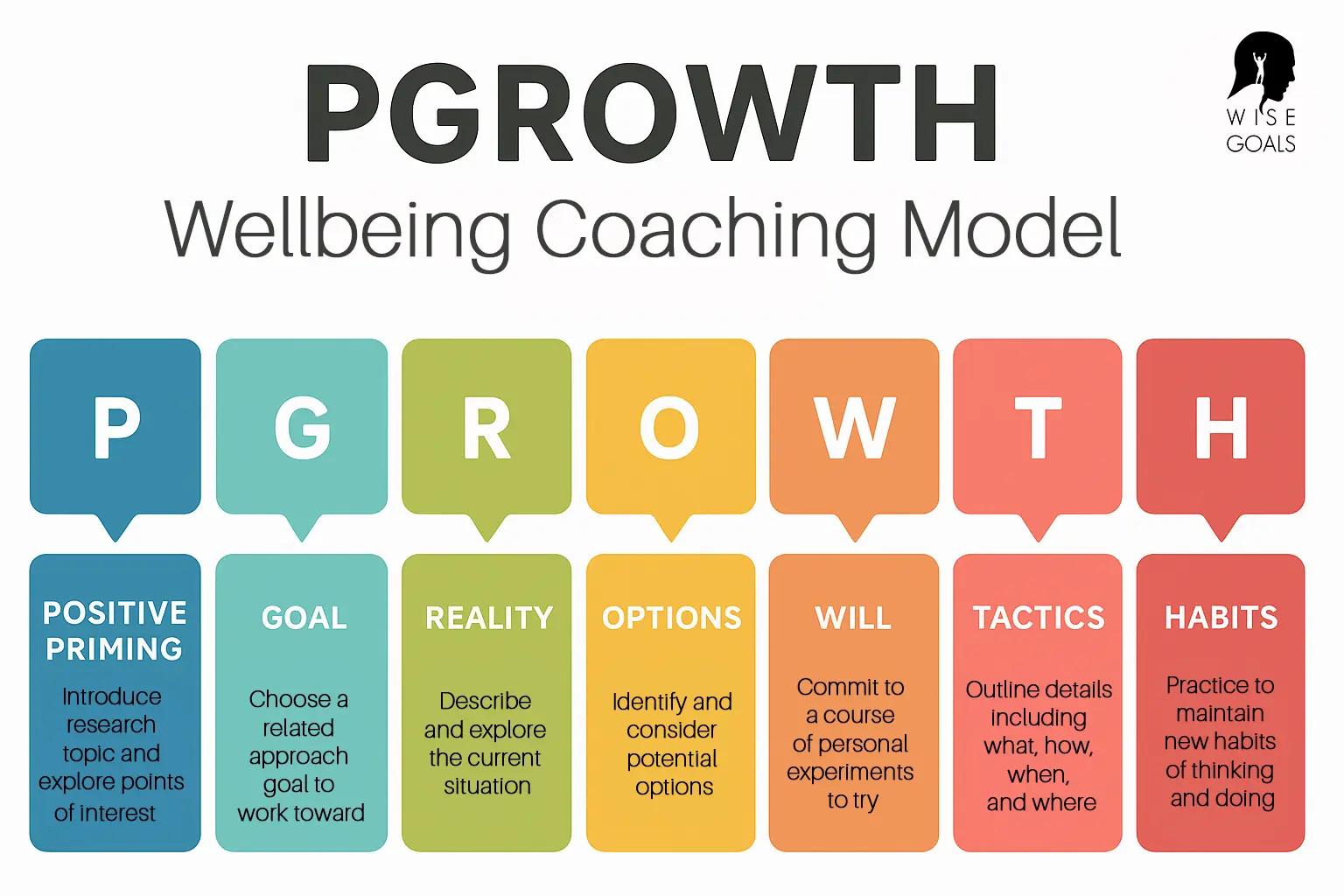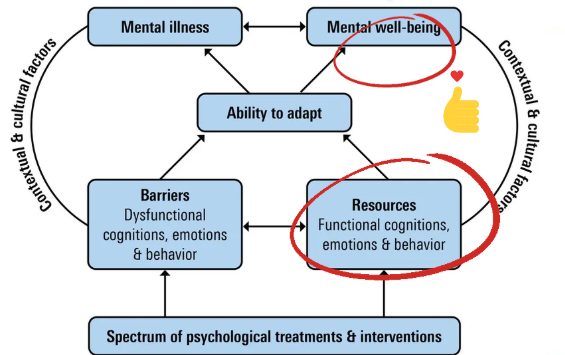- Home
- How to Thrive
- PGROWTH Wellbeing Coaching Model
🌱 The PGROWTH Wellbeing Coaching Model
A new way to support mental health by blending evidence-based learning with coaching
The way we support mental health is changing. Counselling and therapy are essential for reducing distress—but they’re not enough on their own to solve the mental health crisis. Rates of anxiety, depression, and trauma remain high despite decades of therapeutic advances.
Coaching, when informed by wellbeing science, can fill a vital gap: helping people build psychological resources such as resilience, optimism, and constructive habits. This is where the PGROWTH Wellbeing Coaching Model comes in.
✨ Why PGROWTH?
Starting sessions differently changes everything
Traditional coaching models like GROW and GROWTH provide excellent structure. But in practice, over seven years of trying different approaches I noticed that how sessions begin often determines how effective they are.
When sessions started with inspiration and evidence-based wellbeing learning, clients made faster progress, generated more creative ideas, and left feeling energised—not overwhelmed.
PGROWTH builds on this insight by introducing a simple but powerful shift: starting each session with Positive Priming.
There may be resistance to starting this way, but if it is discussed at the outset in contracting then this is no longer a problem. If clients are keen to work in this way but also have some concerns, an additional part of the contracting can include how we (the coach and client) will go about beginning the session in different scenarios building in flexibility.
🧠 The Science Behind the Model
Positive Psychology & Wellbeing Science
Research over the past 25 years has shown that variables like optimism, hope, gratitude, and character strengths are not fluffy concepts—they’re measurable factors that influence how well people function.
Broaden-and-Build Theory
Barbara Fredrickson’s theory shows that positive emotions like interest, humour, or pride broaden our thinking, helping us see more possibilities. Over time, this builds psychological and social resources.
Learning Plus Coaching
As Suzy Green and Stephen Palmer (2019) highlighted in Positive Psychology Coaching in Practice, learning combined with coaching is more powerful than either alone. PGROWTH embeds evidence-based learning into the heart of each session, making it practical and personal.
🧩 The PGROWTH Model: Step by Step
The model adapts the familiar GROW/GROWTH structure but adds an essential first step.

P – Positive Priming
Each session begins with a short wellbeing insight or exercise—such as a research finding, video, or positive psychology activity. This sparks curiosity, interest, or hope, setting an energising tone.
G – Goal
Clients set session goals inspired by the priming stage. These are often approach goals—constructive and motivating.
R – Reality
Clients explore their current situation, challenges, and resources.
O – Options
Broadened mindsets lead to more creative options and practical ideas.
W – Will
Clients choose actions they feel genuinely willing to try.
T – Tactics
Plans are made concrete through clear “how, when, and where” steps.
H – Habits
Finally, attention turns to embedding change over time—creating sustainable habits rather than short-term fixes.
🟢 Key Innovation: Starting with Positive Priming creates conditions for more resourceful, energising conversations—ideal for wellbeing and mental health coaching.
🧠 Applications in Mental Health & Wellbeing
PGROWTH was designed for wellbeing coaching, especially for people facing challenges like low mood, anxiety, and stress. It’s informed by the Sustainable Model for Mental Health, which highlights two complementary sides:
- Reducing dysfunction (e.g., therapy, counselling)
- Building functioning (e.g., coaching, wellbeing science)
While therapy focuses on healing pain, PGROWTH focuses on building capacity—helping clients develop strengths, habits, and ways of thinking that support long-term wellbeing.

For example, people with Adverse Childhood Experiences (ACEs) benefit when protective factors like self-compassion, meaning, and gratitude are actively cultivated. PGROWTH offers a structured way to do this inside coaching sessions.
📚 Positive Psychological Interventions (PPIs)
PGROWTH integrates PPIs during the Positive Priming stage. These are evidence-based exercises that boost wellbeing, such as:
- What Went Well – writing down three good things each day
- Gratitude Letter – expressing thanks to someone who made a difference
- Using Strengths in New Ways – applying personal strengths in daily life
Dozens of studies show PPIs can increase wellbeing and reduce depression. PGROWTH adds coaching structure so these insights become lasting habits. With a highly trained coach, the stuck places that often stop people using PPI's can be talked through and a way can be found that feels right to the client.
🏛️ Raising Standards
For PGROWTH to fulfil its potential, coach training and depth of wellbeing expertise matters. This model is designed for practitioners with Level 7 (postgraduate) training in wellbeing psychology and coaching psychology—equivalent in depth to counsellors.
This ensures coaches can work responsibly, understand when to refer to therapy, and bring both scientific knowledge and relational skill to sessions.
🌍 A Vision for the Future
PGROWTH is both a coaching model and a call to rebalance mental health support.
- Therapy reduces dysfunction.
- PGROWTH coaching builds functioning.
- Together, they create a sustainable, hopeful system of care.
Imagine NHS services (and international equivalents) where patients access both therapy and wellbeing coaching. Trauma can be processed, and resilience actively built. Recovery can be faster, relapse lower, and everyday life stronger.
🟡 Conclusion
The PGROWTH Wellbeing Coaching Model began with one question:
What if we started coaching sessions differently?
By beginning with evidence-based wellbeing learning, PGROWTH transforms the tone and trajectory of coaching conversations—making them more energising, constructive, and sustainable.
It blends wellbeing science with coaching psychology to help people function well, even in the face of difficulty.
Affiliated With
We are proud to be part of professional networks that value evidence-based practice, inclusion, and social impact.



